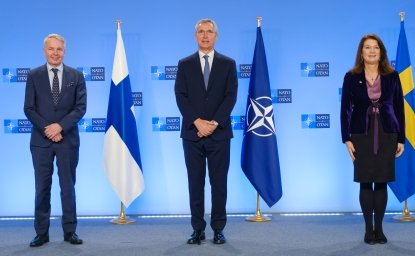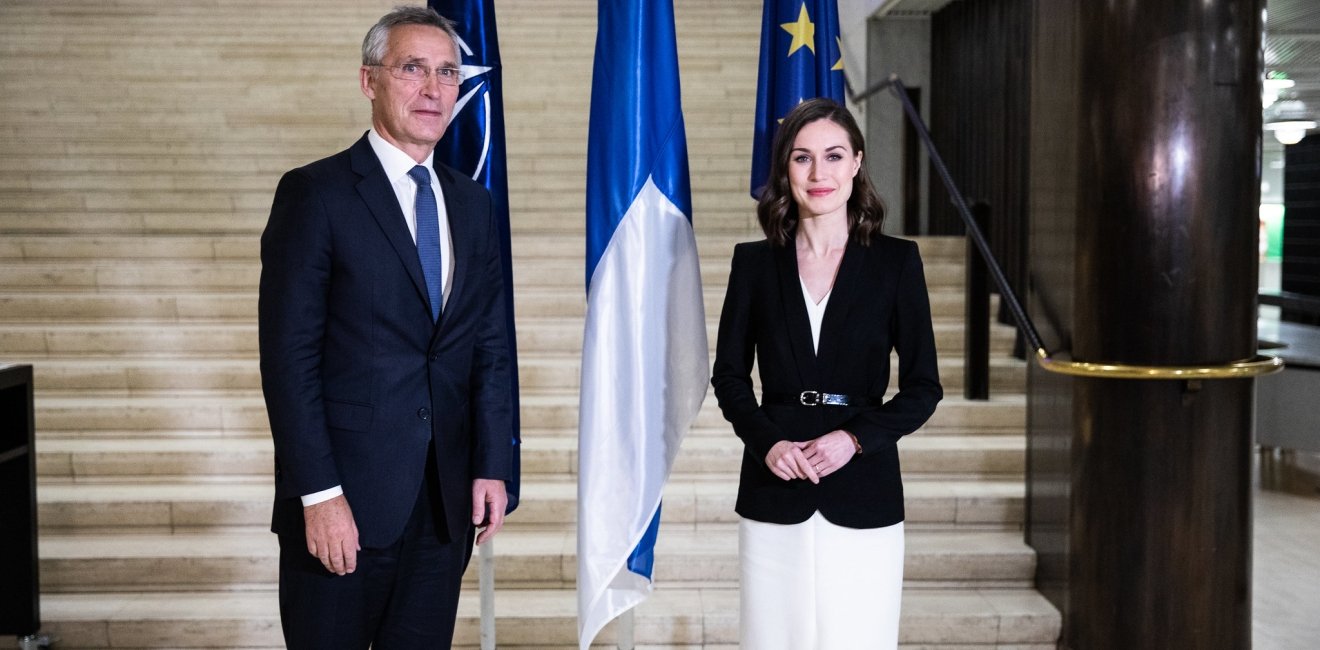Russia’s invasion of Ukraine on February 24, 2022 forever changed Europe. It rekindled dormant discussions over security architecture and lent renewed importance to alliances. Finland has experienced a remarkable pivot in its security policy since the invasion – decades of stable public opinion had never exceeded 30 percent approval for NATO membership but has now doubled to 62 percent. Importantly, the number of those opposed to NATO membership has plummeted since the invasion: from 40 percent against in 2021 to only 16 percent today. Reflecting on the historic security shift underway in Finland requires an assessment of 1) the current debate surrounding NATO membership in Finnish society, 2) next steps in Finland’s potential membership, and 3) the pros and cons of NATO membership for Finland.
Dramatic shift underway in Finland’s security debate
The conversation today around NATO membership in Finland has two distinct components – a national debate and international consultations. The national debate consists of an uptick in media discussions, official parliamentary procedures discussing the changes in the security environment, and the commissioning of a new report to review Finland’s security relationships in light of the invasion of Ukraine. The Finnish parliament currently shows 95 out of 200 members of Finnish Parliament are in favor of joining NATO while only 14 oppose. Most significantly, all political parties acknowledge that the security environment has permanently changed. The ongoing debate in Finnish society is exploring the realities of a change in its security architecture and is a reflection of the seriousness of the situation. According to Prime Minister Sanna Marin, “Russia is not the neighbor we thought it was.” As the security debate unfolds over the coming months, party leaders, the government, and the President are expected to publicly state their stance on NATO.
Finland has met with nearly all NATO members in recent weeks and is discussing practical next steps for deepening cooperation. Abroad, Finnish President Niinistö has met with leaders such as President Biden, President Macron, Prime Minister Johnson and the Joint Expeditionary Force (JEF) countries, as well as German Chancellor Scholz. The frequency of these visits is beyond standard diplomacy and suggests that Finland is lobbying all NATO capitals in consideration of the NATO option. Finland must also coordinate with Sweden, another aspiring NATO member that hasn’t seen the same groundswell of support, but whose prospective membership is often seen as paired with Finland’s.
Membership when?
Assuming NATO membership for Finland seems likely, the looming question is – when will it take place? Estimates of the duration of potential Finnish accession vary depending on the source. Former NATO Secretary General Anders Fogh Rasmussen has stated that Finland could join overnight, while, when asked about Sweden’s accession process, current NATO chief Jens Stoltenberg commented it could take place in a matter of months. The process of Finland joining NATO will likely begin in the coming months. On April 2, Prime Minister Sanna Marin stated that “any potential Finnish bid to join NATO” would have to be made “before summer”. Some Finnish MPs are pushing for Finland to begin the membership procedure before the June NATO Summit in Madrid. Finland's NATO compatibility, including its acquisition of 64 U.S.-made F-35 fighter jets, would likely accelerate the process of membership.
NATO’s message to Finland has been clear - the door remains open to join the alliance. More importantly, as a potential applicant, Finland has strong merits and fully meets the membership criteria. It has been an EU member state since 1995, a NATO partner since 1994 and is a stable democracy. Importantly, it has a credible defense of its own and is a security contributor in Europe and for NATO. Opinion polls suggest that approximately 75 percent of the population are willing to fight for their country, one of the highest rates in Europe. Finland boasts a proactive society-wide comprehensive security strategy, including defensive infrastructure and more than six months of all major fuels and grains in strategic stockpiles. It has a wartime strength of 280,000 combat soldiers.
A successful Finnish NATO accession demands unanimity by existing members to admit new members. Multiple NATO member states (the United States, United Kingdom, France, Turkey, Canada, Norway, Estonia, Iceland and Portugal) have indicated that it would be very unlikely that they would close the door for Finland. Hungary, however, could potentially deflate Finland’s NATO membership aspirations. According to researcher Katalin Miklóssy of the Aleksanteri Institute of University of Helsinki, President Viktor Orbán, who has a track record of appeasing President Putin and, in addition to publicly opposing a Ukrainian NATO membership since 2014, is expected to assert additional demands for a Finnish NATO membership.
There is no clear precedent, but looking at the most recent countries to join the NATO alliance can serve as an indicator as to how this process might unfold for Finland. Montenegro was invited to start accession talks to join the alliance in December 2015 and became a full member in June 2017, about 18 months later. North Macedonia, although not as clear of an example of the path into the alliance due to complications surrounding its name and implementing the Prespa agreement, only took 14 months to join the alliance. Croatia and Albania, who joined together in 2009, much like how Finland and Sweden might join together, took 12 months from invitation to start accession talks to full membership, demonstrating that NATO can process multiple membership applications at once. None of these are analogous to Finland’s prospective membership; Finland boasts a higher degree of interoperability with NATO allies and a longer track record of partnership. Given the current exceptional situation, the process could be remarkably quick.

Implications of membership
Finland joining NATO would bring a number of benefits to all parties, while the main benefit of being a member would be deterring Russian aggression. However, to avoid provoking conflict with Russia during the application process, a security guarantee would be essential. It is likely that when President Niinistö met with President Biden he discussed how to best prevent potential preemptive Russian aggression prior to successful accession.
In the long run, NATO membership would impact the Finnish economy positively: it would likely enhance Finland’s image as a safe country to conduct business. Eighty percent of Finnish economic experts agree that the net effect of NATO would be beneficial to Finland’s economy. With reduced political risk, foreign multinational companies would feel more confident investing in Finland.
Joining the alliance could also lead to considerable fallout. In the immediate future, “Finns must be prepared for influencing efforts from Russia during NATO debate” according to the Finnish Security and Intelligence Service. After a successful NATO accession, tensions at the Finno-Russian border will likely rise. Russia might act on its promised counter measures to ramp up its immediate military reinforcements. According to President Niinistö, this could include “border violations, even area violations. And hybrid threats.” Finland would also need to grapple with its stance on nuclear weapons as part of an alliance whose members possess nuclear weapons capability. It could follow the Norwegian model, where the stockpiling or deployment of nuclear weapons is not permitted within its border.
In the short-term, NATO membership for Finland could lead to economic retaliation. Potential impacted areas include energy imports, such as natural gas and petroleum, and industrial goods. As of 2019, approximately 60 percent of its imported energy comes from Russia. Additionally, Finland has granted Russian-owned Rosatom – via the Finnish-owned company Fennovoima – to construct a major nuclear power plant starting in 2023. Russia is deeply dependent on its energy exports; experts predict that the Ukraine war and sanctions will shrink the Russian economy by 10 percent. A complete, sudden ban of energy imports is counterproductive for both countries. Instead, economists suggest imposing import duties as a way of restricting Russia’s ability to finance its war chest.
The next major question is, will Sweden join alongside Finland? Sweden is experiencing the same existential NATO debate, including initiating consultations on its security policy with a full report expected by end of May. However, Sweden has not witnessed the same spike in public support, despite traditionally having more public support for NATO than Finland. “I do not rule out NATO membership in any way,” Swedish Prime Minister Magdalena Andersson said in a recent statement. “But I want to make a well-founded analysis of the possibilities open to us and the threats and risks… involved, to be able to take the decision that is best for Sweden.” As the Finnish debate pulls ahead, Sweden might wind up not joining alongside its sister, but instead it could join later. While there might be a preference for the two to join NATO together, it is unlikely Finland would be denied membership if Sweden is not yet ready to commit.
Finland at a crossroad
Finland’s NATO membership seems increasingly likely. Any decision about membership cannot be made lightly and is not just a decision for the present moment, but for decades to come. Once joined, Finland is part of a defense organization, which carries a commitment to action if an ally is attacked. This foundational, important, commitment must be rigorously debated in Finnish society.
Finland is yet again at a crossroad. The last time Finland faced a comparable question of strategic importance was in 1995, when Finns joined the European Union after the collapse of the Soviet Union. Finland faced a hard decision regarding its national identity: to be neutral, or to be part of the West. Now Finland faces another choice: remain militarily unaligned and deepen cooperation with allies, or join NATO and achieve a higher level of security.
The final decision should be based on rational grounds that stand the test of time. Given Russia’s recent war crimes and broader unpredictability, political calculus favors Finland to reconsider its security environment. As the debate unfolds, Finland will need to weigh all of the implications of NATO membership. To quote the commander-in-chief of the Finnish Defence Forces, President Sauli Niinistö: “In times of extreme change, we must keep a cool head.”
Authors



Global Europe Program
The Global Europe Program is focused on Europe’s capabilities, and how it engages on critical global issues. We investigate European approaches to critical global issues. We examine Europe’s relations with Russia and Eurasia, China and the Indo-Pacific, the Middle East and Africa. Our initiatives include “Ukraine in Europe”—an examination of what it will take to make Ukraine’s European future a reality. But we also examine the role of NATO, the European Union and the OSCE, Europe’s energy security, transatlantic trade disputes, and challenges to democracy. The Global Europe Program’s staff, scholars-in-residence, and Global Fellows participate in seminars, policy study groups, and international conferences to provide analytical recommendations to policy makers and the media. Read more

Explore More
Browse Insights & Analysis
Sisters But Not Twins: Prospects of Finland and Sweden’s NATO Accession

360° View of How Southeast Asia Can Attract More FDI in Chips and AI


